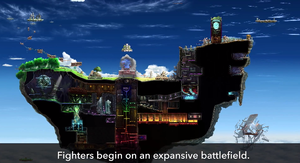Smash Run: Difference between revisions
TailsCopter (talk | contribs) No edit summary |
m (→Known enemies) |
||
| Line 28: | Line 28: | ||
|[[Bill Blaster]]||{{symbol|mario|24px}} {{uv|Mario}} | |[[Bill Blaster]]||{{symbol|mario|24px}} {{uv|Mario}} | ||
|- | |- | ||
| | |[[Blue Bubble]]||{{symbol|zelda|24px}} {{uv|The Legend of Zelda}} | ||
|- | |- | ||
|[[Bonkers]]||{{symbol|kirby|24px}} {{uv|Kirby}} | |[[Bonkers]]||{{symbol|kirby|24px}} {{uv|Kirby}} | ||
Revision as of 11:12, June 20, 2014
Smash Run (フィールドスマッシュ, Field Smash) is a gameplay mode set to appear exclusively in Super Smash Bros. for Nintendo 3DS. The mode starts with a five minute adventure course involving exploration and battling enemies from both Brawl's The Subspace Emissary and other game series. Through defeating these enemies, as well as opening chests, breaking targets similar to those found in Break the Targets, and other methods, power-up markers can be found and picked up and are used for increasing various stats for the player's character. Players will also have to be careful while adventuring, as there are enemies that can steal their power-ups, as well as the risk of getting power-ups knocked out of them by other players that they might meet up with, (though Sakurai himself recommends to refrain from going at each other during the five minutes). Prior to starting, players can equip themselves with special items that they can use during the match. Upon the expiration of the five minutes, any power-ups collected are added to the characters stats, and the players fight each other in a match with a one minute time limit. This may be a normal battle, a battle with a modifier (similar to Special Melee or Special Brawl), or else a vertical or horizontal race.
In addition to being attacked normally, certain Smash Run enemies can be grabbed. They can then be pummeled and thrown as any other character can be. These enemies can also be inhaled, and swallowing them simply deals damage instead of instantly defeating them.
Other elements from the previous Smash games appear in the enemy course as well, including doors like those in The Subspace Emissary and targets that can be broken to yield power-ups.
After a match, players can acquire an award that they can use for character customization.
List of power-ups
The following items can be found by defeating enemies, opening chests, and completing miniature missions within the mode. Each item has its own use, and will help the player in some way during the coming fight. Additionally, every item can be found in different sizes, which presumably alters how much of each stat will be boosted. There appears to be a maximum of 1000 arbitrary points for each category.
 Speed (移動, Movement): A green item resembling a boot. Known to boost dashing speed; may also boost walking and air speed.
Speed (移動, Movement): A green item resembling a boot. Known to boost dashing speed; may also boost walking and air speed. Jump (ジャンプ, Jump): A yellow item resembling a wing. Increases jumping height, also appears to increase falling speed.
Jump (ジャンプ, Jump): A yellow item resembling a wing. Increases jumping height, also appears to increase falling speed. Attack (通常ワザ, Normal Technique): An orange item resembling a boxing glove. Boosts power of all normal attacks.
Attack (通常ワザ, Normal Technique): An orange item resembling a boxing glove. Boosts power of all normal attacks. Special (必殺ワザ, Special Technique): A red item shaped like a starburst. Boosts power of all special moves.
Special (必殺ワザ, Special Technique): A red item shaped like a starburst. Boosts power of all special moves. Arms (投げ・アイテム, Throw/Item): A purple item resembling a sledge-hammer. Increases strength of projectiles, item attacks, and throws. Is is unknown how this distinction operates on special moves that involve projectiles, items, or throws.
Arms (投げ・アイテム, Throw/Item): A purple item resembling a sledge-hammer. Increases strength of projectiles, item attacks, and throws. Is is unknown how this distinction operates on special moves that involve projectiles, items, or throws. Defense (防御, Defense): A blue item resembling a generic shield. Makes it more difficult to launch characters; it is currently unknown whether this is an increase in weight or a decrease in knockback taken (which may also result in flinch resistance).
Defense (防御, Defense): A blue item resembling a generic shield. Makes it more difficult to launch characters; it is currently unknown whether this is an increase in weight or a decrease in knockback taken (which may also result in flinch resistance).
Known enemies
Origin
Smash Run is based in concept on City Trial from Kirby Air Ride, another game directed by Masahiro Sakurai, who explained that he wanted to recreate the mode in the game. In that mode, players would explore a large city to collect power-ups for their vehicles before proceeding to race with those power-ups active.
Gallery
Mario in a wooded area, also before the mode was revealed.
- SmashRun-2.png
Little Mac fighting two Kremlings and a Goomba.
Wii Fit Trainer breaking targets.
- SmashRun-6.png
Samus fighting a Bulborb, Tiki Buzz, and Giant Goomba.
Fox along with various power-ups.
- SmashRun-9.png
Pikachu's shown stats for Smash Run.
Pit participating in Smash Run.
Donkey Kong fighting against enemies in Smash Run.
Charizard grabbing a Waddle Dee.









